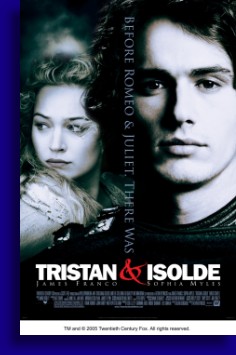

Reviewed by
Bud Carlson


We
have recently suffered through a spate of disappointing movies set in
ancient or medieval Britain (most notably the recent “King
Arthur”). So I thought it was pretty
risky for a filmmaker to “try again,” particularly with
story based on a much lesser known legend. The film “Tristan and Isolde” attempted to be an epic romance, but instead fell flat, disappointing on many different levels.
The legend of Tristan and Isolde
was one of the most influential romantic tales of the medieval period,
predating and influencing the Arthurian romance of Lancelot and
Guinevere. This legend has roots going back
as far as the twelfth century, and like any good ancient tale, there
are many versions of the story. In this movie’s retelling,
Tristan is the son of an English tribal king, but his parents are
pillaged by the marauding Irish when he was just a boy. He is rescued
and raised as a nephew by Lord Marke (the
king of a neighboring English tribe from Cornwall), and he grows to
become the tribe’s most-skilled warrior (and all-around village
good-guy). Lord Marke’s primary
political ambition is to unite the tribes of England into a unified
force after the fall of Rome, so that the British can better stand-up
to the Irish forces.
The storyline of the movie really picks up during an otherwise-routine skirmish between the forces of Cornwall and those of King Donnchadh of Ireland. During the fighting, Tristan goes one-on-one with Ireland’s best fighter and defeats him, but suffers a wound from a poisoned sword. The poison renders him near-dead, and his fellow fighters assume he’s deceased, and they launch his body to sea aboard a small boat which eventually lands on the shores of Ireland. Isolde, the only daughter of King

Donnchadh,
finds the ailing Tristan among the small boat’s wreckage on the
beach, and secretly nurses him to health while pretending to be a
handmaiden. Of course the two fall
passionately in love, but are then separated when Tristan is forced to
flee to his homeland, and the two must accept that they will never see
each other again. Meanwhile, in an effort to keep the tribes of England
from becoming a unified force, King Donnchadh offers up his daughter Isolde’s hand in marriage to the winner of an open tournament of hand-to-hand fighting. Tristan unwittingly enters and fights in Lord Marke’s name (under the pretext that his winning this tournament will somehow help to keep the Brition’s unification plans on tract), and wins Isolde
as a wife for his uncle. The cruel triangle that results forces all
three to decide where their true loves and loyalties lie, a struggle
that could destroy the fragile Briton kingdom.
Hollywood’s
ability to take a perfectly good story and turn it into a disappointing
movie has never ceased to amaze me. In the case of Tristan & Isolde,
I’m afraid this is exactly what has happened, as the story itself
is far more interesting than the movie allows itself to be. The
romantic tale of this couple has been shared among people for over nine
centuries, yet the movie may not make it much past the opening weekend.
Armstead’s Second: Since this fable is purported to be the precursor to Romeo and Juliet, then fifteen minutes in you’ll be praying for Isolde to hurry up and do the Juliet thing and put us out of our misery. But alas, it’s not meant to be and we are subjected to another good 100 minutes of her incessant whining and Tristan’s singular mood of pouting and feeling sorry for himself. The one thing that could have saved this overly drab, overly long, melodramatic mess is if Tristan, upon awakening from his poison induced slumber, thrust his sword into Isolde’s heart. Then upon seeing what he had done, fell upon the sword himself in despair. And have that happen in the first 10 minutes. Then roll credits. THAT I’d go see over and over again.
